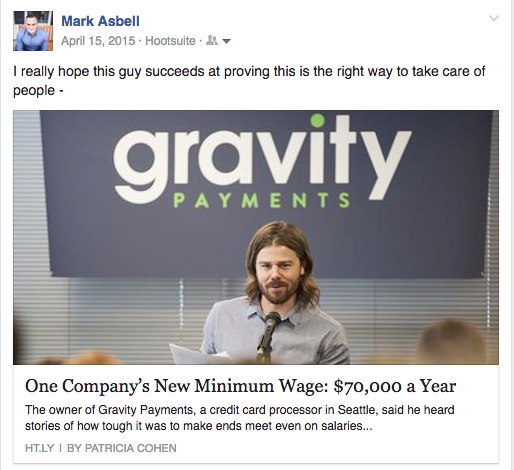Our two oldest kids are both in middle school – the tween and early tween years. They are beyond spanking, naughty corner, and to an extent, they’re even over being “grounded”, or restricted, from things. So I remembered that when I was their age one of my good teachers would punish my fellow misbehaved students and myself by making us handwrite what was called a “Maturity Paper.” It was a creative correction of that time, and it must have been at least somewhat effective because I remember it all these years later.
I don’t have a copy of the maturity paper and couldn’t remember everything it said, but I remember the gist of it being to outline what it means to be mature and why it is important. One point it made that I remember being very impactful for me was, “Maturity doesn’t have to say ‘I told you so’.” I think I still struggle with that one because, well, it’s a fact, I’m right a lot, and when that becomes obvious in situations people tend to never admit they were wrong so it’s hard not to tell them. The same is true with ideas, there is always someone claiming an idea like it was their own when it isn’t. Anyway – I’m definitely not an expert which means I’m wrong sometimes, and I’m telling you now that this idea was not all my own. I’ve come a long way 🙂
Since I couldn’t find a copy of the maturity paper that helped me when I was a kid, I decided to make one up on my own, and I’m calling it a ‘Character Development Paper’. Just so you don’t read this and think that I’m a terrible narcissist (everybody has some narcissism – at least I admit it), I’m going to walk through each part of it and explain my thoughts and intentions for why it is written the way it is. And don’t forget – you are the expert at what your kids need, so you are completely free to customize this how you see fit. So here’s how it starts:
I, (name) , as a Christ following believer, understand that my life is a journey of becoming the best version of who God created me to be. I understand that developing strong character is one of the fundamentals of my journey, and it is especially important to build a foundation of strong character in the adolescent stage of life I am in.
Ok – obviously we’re identifying the victim, I mean the offender deserving of this consequence. The part about being a believer is because I know that my kids have professed their belief in Jesus Christ as our savior, so I am tying the purpose of this paper to their pursuit of God’s plan for their life which includes being a living example of Jesus. The reference to “the adolescent stage of life” is because if you haven’t had kids this age yet you will find out that they think they are much older and much more mature than they really are, and I included that language in this paper to remind them very factually – they’re still kids. People often mention that teens want to be treated like adults and I think they confuse the point that to mean that having the freedom of an adult without having the responsibility of one. So I’m starting to treat my kids like adults by letting them know that to be responsible with the freedom of an adult requires having strong character.
I’m thankful my parents are also Christ following believers who love me and care about my best interests. They have reasonable expectations of me with the intention of helping me develop strong character, learning ability and working skills.
Our world is full of people telling our kids that parents are lame, we don’t understand them, and we’re unnecessarily protective or restrictive. By including this section in the paper I’m having my kids put in writing that we share a faith that drives us and I do understand that. I have a saying that goes, “I don’t have to be an expert at trends to be an expert a sins.” Don’t tell me I don’t understand what kids are facing just because it’s on a digital device nowadays, and besides that I’m not so old I don’t see the pressures of all the ways ‘things are different’ now. In this section I’m having them write that we love them and every decision we make is because of their best interests, and I’m making it clear that part of my job is to teach them character, teach them what they need to know to have a learning ability that enables them to learn whatever they need to know throughout life, and teach them how to work and apply their character and learning ability. With character, teachability, and work ethic they can go figure out what they love and are gifted to do and they can accomplish great things.
It is up to me to respect my parent’s knowledge, experience, and authority; to learn from their example of striving to develop stronger character in our family, including themselves. It is up to me to discipline myself to follow my parent’s expectations to the best of my ability at all times. Failure to do so not only hinders my own development, it might also hinder the impact I have for God.
The point of this section is to help our kids realize that we all have to take ownership of our own character development. Writing this lets them know that we are working on our own character just as much as they should be working on theirs. It also reminds them of the verse about honoring your mother and father and failing to do that is sin and sin hinders not only their development, and not only their relationship with us and God, but it can also hinder the impact they have for God. Yes, we’re all forgiven and God can use our mess for His message and our pain for His purpose and any other preacher tagline we can think of right here. But even God would rather us not have a mess and pain if we would simply choose not to, so it is ok for us to want our kids to avoid mess and pain.
Romans 5:3-5 states: “…we rejoice in our sufferings, knowing that suffering produces endurance, and endurance produces character, and character produces hope, and hope does not put us to shame, because God’s love has been poured into our hearts through the Holy Spirit who has been given to us.”
Suffering through hand-writing this serves as a reminder that I owe it to God, myself and others to stop denying my development by choosing
(fill in behavior or choice to correct)
Writing this signifies my choice to rejoice in the suffering required to develop the character that produces hope I am not ashamed of – hope in God’s purpose for my life.
In this section I want my kids to start learning that being a Christian isn’t just a get out of hell pass and that we’re not supposed to act however we want just because we’re forgiven. I want my kids to learn to listen to the Holy Spirit in us that causes us to feel conviction. I want them to learn to embrace the process of accepting consequences and allowing the suffering to strengthen their endurance through it so that their character is shaped on the other side of it and that keeping our hope in God’s love and purpose for our life is the point of it.
Some other things to note. I don’t use this all the time. In fact, I’ve only used it a few times. I find myself going to it in situations where I feel very frustrated with the behavior I’m observing – usually repeated behaviors rooted in a lack of character that is not changing with other forms of correction. It seems to be very well received and we’re believing it is effective. Developing character is a lifelong process – time will tell. Here’s what I know with great certainty. If my kids have to write this as much as I had to write that maturity paper, it will leave a lasting impression.
Go ahead and download a copy by clicking this link:
Character Development Paper




 Serving people is hard work. It can be exhausting mentally, emotionally, and even physically. Current culture teaches us that unless we somehow protect ourselves from the taxing effects of serving people then we might burn out. The unfortunate result of that mentality is many people are “serving” without really caring.
Serving people is hard work. It can be exhausting mentally, emotionally, and even physically. Current culture teaches us that unless we somehow protect ourselves from the taxing effects of serving people then we might burn out. The unfortunate result of that mentality is many people are “serving” without really caring.